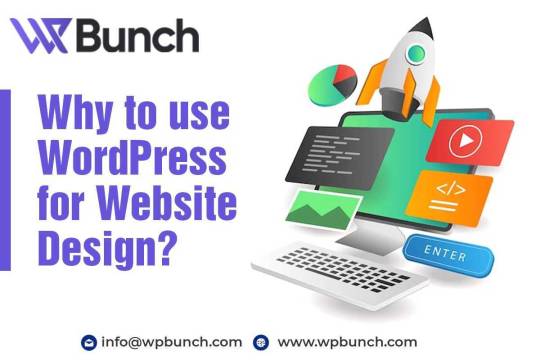#website development using wordpress
Explore tagged Tumblr posts
Text
The Future of WordPress: How the API is Making It Easier Than Ever
The future of WordPress is becoming increasingly promising, thanks to the growing role of its API (Application Programming Interface). The API is simplifying and expanding WordPress's capabilities in several ways:

Headless WordPress: The API allows for headless custom WordPress development services setups, decoupling the front-end and back-end. This flexibility enables developers to create highly customized and interactive websites while still benefiting from WordPress's content management capabilities.
Easier Content Distribution: With the API, content can be easily distributed to various platforms and devices, ensuring a consistent user experience across web, mobile apps, and more. This facilitates content syndication and improves audience engagement.
Enhanced Plugin and Theme Development: Developers can create innovative plugins and themes that seamlessly integrate with WordPress through the API. This opens the door to a wealth of possibilities for extending functionality and design options.
Improved Performance: Decoupled setups utilizing the API often result in improved website performance and faster page loading times, enhancing the user experience and SEO rankings.
Cross-Platform Integration: WordPress's API enables integration with a wide range of external services, from social media platforms to e-commerce solutions, making it easier than ever to create holistic digital experiences.
Simplified Workflow: Developers can use modern web development tools and technologies, such as JavaScript frameworks, to build WordPress-powered sites more efficiently. This streamlined workflow leads to faster development cycles.
Conclusion
The WordPress API integration is driving the platform's evolution, making it more versatile, scalable, and adaptable to the changing needs of web development. As it continues to evolve, WordPress remains a robust choice for creating a wide variety of websites and applications, ensuring a promising future for this popular content management system.
#wordpress integration services#custom wordpress development services#wordpress#website development using wordpress
0 notes
Text
The Future of Visuals: From Flat to Immersive
From flat design to depth and dimension: Exploring the impact of 3D graphics and animation. The evolution of holographic elements: Bringing virtual objects to life on websites. Creating a truly immersive experience: How to integrate these elements for maximum impact.

Get Free website designing course 2025 👈
Clear Purpose and Goals: Define the primary objective of the website. Ensure that every element on the site supports this goal.
User-Friendly Design: Prioritize intuitive navigation and clean layout. Make sure the design is accessible and easy to use for all users.
Responsive and Mobile-First Design: Ensure the website works well on all screen sizes. Start with mobile design as more users access websites on mobile devices.
5 Important ways to develop responsive website
Fast Load Time and Performance
Optimize images and code for faster loading.
Use caching, a good hosting provider, and efficient coding practices.
Strong SEO and Content Strategy
Use relevant keywords, proper headings, and metadata.
Create valuable, high-quality content that helps your audience and ranks well on search engines.
#us school system#education system#high school education#free science education#learn web development#learn design#learn about physics#learn graphic design#learn animation#learn web design#learn website design#responsive web design#responsive website#responsive wordpress template#website optimization#website developer near me#3d banner design#3d image design#3d vector design#3d website#well designed website#website development
5 notes
·
View notes
Text
Custom WordPress Development Company
Looking for a reliable custom WordPress development company? We specialize in creating fully customized, high-performance WordPress websites tailored to your business needs. From theme development to plugin customization, our expert team delivers scalable, SEO-friendly, and responsive solutions that drive results. Partner with a trusted custom WordPress development company to build a site that stands out and grows with your brand.
#custom WordPress development company#best wordpress development company#$99 wordpress website#amazing wordpress websites#ecommerce website using wordpress#web development using wordpress#wordpress ecommerce development services#wordpress web development agency#wordpress website development agency#wordpress web development services#wordpress website services#wordpress design services
0 notes
Text
WooCommerce Development Company in New York
WooCommerce Development Company in New York – LDS Engineers Are you looking for a depended-on WooCommerce development agency in New York? Look no similar to LDS Engineers, a main issuer of delicious WooCommerce website development offerings throughout the globe. Whether you’re within the US, India, UK, or Australia, our professional team is prepared to deliver innovative, scalable, and sturdy…

View On WordPress
#business#e-commerce#ecommerce#marketing#woocommerce development#woocommerce development services.#woocommerce web development in india#woocommerce website development services#woocoommerce web development in us#wordpress
0 notes
Text
Top Reasons Why WordPress Is The Best Platform For Blogging Websites?
Do you want to know Reasons Why WordPress Is The Best Platform For Blogging Websites? Aphonic Solutions gives all details you need to know like, why WordPress is the best, Benefits Of Using WordPress, Tips For Creating A High Quality Website, etc. If you want to build WordPress websites, contact us!

#web development company in india#Benefits Of Using WordPress#High Quality Blogging Website#WordPress websites#why WordPress is the best
1 note
·
View note
Text

#Expert Web Designing#A Website Designing Company in Ahmedabad is a full service Digital Marketing Company in Ahmedabad#Providing excellent digital solutions over 12+ years. Our custom solutions are made to fulfill each client’s unique goals#empowering our partners to use the web to its full potential while exceeding expectations along the way. As a Best Web Development Company#we have the experience and specialized knowledge to deliver outstanding solutions for regulation compliance heavy industries. We also provi#Master in Digital Markeitng Course in Ahmedabad#Search Engine Optimization Course in Ahmedabad#WordPress Course in Ahmedabd & lot.#At Expert Web Designing#our bespoke Web Designing#Digital Marketing & all services are always tailored to suit the needs of each client. Whether we are updating an existing function or crea#we combine creativity with technological know-how. We will help your business grow to new heights through qualified online exposure. We put#strategies and proven conversion techniques. Our experience#coupled with our passion#has afforded us the opportunity to maintain long-term relationships with our clients. Partnering with us will help your business succeed an#and at the same time#keep our fees affordable
1 note
·
View note
Note
In your view/experience. is the rate of "incompleteness" among webcomics more or less the nature of online personal projects as a whole? Or is there something specific to webcomics like laboriousness, audience expectations, relative medium infancy or whatnot?
well for one thing webcomics has changed significantly in the last ten years. it used to have a much lower barrier for entry, just get a smackjeeves account or set up a website with a wordpress plugin. starting a webcomic when i started my webcomic vs starting a webcomic now are totally different experiences.
so i can only speak to people who started their webcomics roughly ten years ago. and roughly ten years ago a lot of us were a whole lot younger with a lot more time and energy to spend on a comic for free. this part is probably still somewhat true for new artists.
but then you get older. your ideas change. your skill develops and the old stuff isn't as good. or you don't have as much time, you got a day job. unless you're one of like five people on earth your webcomic is not paying your rent. you need to make money. your shoulder hurts. you're 30 now. you're struggling to make updates on time between whatever else makes you happy and what else you need to do to live. you wrote this story when you were 21, you don't relate to it anymore, you have different ideas, you've grown up, your audience has noticeably dropped off from the peak, social media managing is hard, you have to go to work, you're so tired, all the time.
it's a lot of things.
10K notes
·
View notes
Text
Why To Use WordPress for Website Design?
Are you looking to Use WordPress for Website Design? WP is a leading Web design and development company in India. We also offer exceptional graphic designing services in India. in this blog, we define some points regarding the uses of WordPress for website designing.

#Custom Website Development Company in India#Develop and Design#E-commerce Sites#Graphic Designing Services in India#Online Shopping Sites#Seo Services India#Use WordPress
0 notes
Text
WordPress Website Development Cost, Expertise, and Other Details- Check This Out
In the ever-evolving digital landscape, a robust online presence is essential for businesses to thrive. Among the myriad of web development platforms, WordPress stands out as a powerhouse, empowering businesses with scalable, feature-rich websites. As businesses in the USA seek to leverage WordPress for their online ventures, understanding the costs, expertise, and services offered by WordPress website Development Company becomes crucial.

The Rise of WordPress Website Development in the US
WordPress has emerged as a leading choice for website development due to its user-friendly interface, extensive customization options, and a vast library of plugins and themes. Its flexibility caters to businesses of all sizes, from startups to enterprises, seeking a dynamic and engaging online presence. All you need is the best WordPress website development company in USA for your projects.
1. Factors Influencing Cost:
- Scope of the Project: The complexity and scale of the website significantly impact development costs.
- Customization Requirements: Tailoring the website with unique features and functionalities adds to the overall cost.
- Design and Themes: Premium themes or custom design work contribute to the expenses.
- Plugins and Integrations: The need for specific plugins or integrations influences the cost.
2. Cost Range:
- Basic WordPress Site: Ranges from $1,000 to $5,000 for a simple, template-based website with minimal customization.
- Customized WordPress Site: WordPress website development cost can vary from $5,000 to $15,000 or more, depending on the level of customization and complexity involved.
- Enterprise-Level Solutions: High-end, complex websites can exceed $20,000 due to extensive features and functionalities.

Expertise Offered by WordPress Website Development Companies
1. Technical Proficiency:
WordPress development companies in the USA boast a skilled team proficient in PHP, HTML, CSS, and JavaScript, enabling them to create dynamic and responsive websites.
2. Customization and Design:
Expert developers specialize in crafting unique designs and customizing websites to align with the brand's identity, ensuring a distinct online presence.
3. Plugin Development and Integration:
These companies excel in plugin development and integration, leveraging the vast array of WordPress plugins to enhance website functionalities.
4. SEO Optimization:
WordPress development firms prioritize Search Engine Optimization (SEO), optimizing websites for better visibility and higher rankings on search engines.

Services Offered by WordPress Website Development Companies in the USA
1. Website Development:
Companies offer end-to-end website development services, ensuring the creation of visually appealing, user-friendly, and functional WordPress websites.
2. Theme Customization:
Customizing themes to reflect the brand's identity and cater to specific business requirements is a core service offered by WordPress development firms.
3. Plugin Development and Integration:
Leveraging existing plugins or developing custom ones, these companies enhance website functionalities to meet unique business needs.
4. Maintenance and Support:
Beyond development, companies provide ongoing maintenance and support services, ensuring websites remain updated, secure, and optimized.
The Future of WordPress Website Development
As technology advances, WordPress continues to evolve, adapting to changing trends and user demands. The future of WordPress development in the USA is poised to embrace:
- Mobile Responsiveness: Further optimization for mobile devices to cater to the growing mobile user base.
- AI and Automation: Integration of AI-driven solutions and automation for enhanced user experiences.
- Enhanced Security Measures: Strengthening security protocols to combat evolving cyber threats.
Conclusion
WordPress website development has revolutionized the way businesses establish their online presence. In the USA, WordPress development companies offer a spectrum of services, catering to diverse business needs and budgets. As businesses navigate the digital realm, understanding the costs, expertise, and services provided by WordPress development firms becomes instrumental in achieving a compelling and competitive online presence.
0 notes
Text

Affordable Web App Development Services | Designing Solutions
There are a number of affordable web app development companies available. Affordable web app development companies can help businesses to create high-quality applications without breaking the bank. Visit our website today online.
#Affordable Web App Development Services#app development#Web Development Services#Best Web Development Companies#Best Web Development Company#Best Web Development Company in India#World Class Web App Developers#Hire Best Website Developers Today#Best Website Development Services for Small Businesses In Mohali#Custom Website Development Services For any Business#Ecommerce Website Development Services for any Business#Wordpress Website Development Services That Are Affordable and Easy To Use
0 notes
Text
Top WooCommerce Integration Services to Boost Your Business
Here are some of the leading WooCommerce integration services that can enhance your online store. WooCommerce Shipping facilitates a smooth connection with major shipping carriers like UPS, FedEx, and USPS, helping you save on shipping expenses and provide customers with diverse shipping options. WooCommerce Payments seamlessly integrates your store with popular payment processors like PayPal and Stripe, widening your payment acceptance capabilities. For effective marketing strategies, WooCommerce Marketing links your store with platforms such as Mailchimp and Google Analytics, expanding your customer reach and potentially boosting sales. Meanwhile, WooCommerce Analytics provides valuable performance insights that can inform improvements in your website's design, product offerings, and marketing campaigns. When considering these services, it's crucial to research thoroughly, factoring in costs, features, and support to select the right fit for your business.
FACEBOOK – INSTAGRAM – TWITTER – LINKEDIN

#wordpress integration services#wordpress api integration#custom wordpress development services#website development using wordpress#woocommerce#WooCommerce development
0 notes
Text
Web Design Trends Shaping 2025
The evolution of web design in 2025 is explored, highlighting the trends that are shaping the digital landscape and influencing user experiences. Key themes like immersive 3D, holographic elements, and interactive design are analyzed to inspire creativity and provide valuable insights for web designers.

Get Free website designing course 2025 👈
Clear Purpose and Goals: Define the primary objective of the website. Ensure that every element on the site supports this goal.
User-Friendly Design: Prioritize intuitive navigation and clean layout. Make sure the design is accessible and easy to use for all users.
Responsive and Mobile-First Design: Ensure the website works well on all screen sizes. Start with mobile design as more users access websites on mobile devices.
5 Important ways to develop responsive website
Fast Load Time and Performance
Optimize images and code for faster loading.
Use caching, a good hosting provider, and efficient coding practices.
Strong SEO and Content Strategy
Use relevant keywords, proper headings, and metadata.
Create valuable, high-quality content that helps your audience and ranks well on search engines.
#us school system#education system#high school education#3d image design#3d designing tools#3d banner design#3d vector design#3d model#responsive web design#responsivewebsite#responsive website#responsive wordpress template#well designed website#html css#react native#react development
3 notes
·
View notes
Text
autocrattic (more matt shenanigans, not tumblr this time)
I am almost definitely not the right person for this writeup, but I'm closer than most people on here, so here goes! This is all open-source tech drama, and I take my time laying out the context, but the short version is: Matt tried to extort another company, who immediately posted receipts, and now he's refusing to log off again. The long version is... long.
If you don't need software context, scroll down/find the "ok tony that's enough. tell me what's actually happening" heading, or just go read the pink sections. Or look at this PDF.
the background
So. Matt's original Good Idea was starting WordPress with fellow developer Mike Little in 2003, which is free and open-source software (FOSS) that was originally just for blogging, but now powers lots of websites that do other things. In particular, Automattic acquired WooCommerce a long time ago, which is free online store software you can run on WordPress.
FOSS is... interesting. It's a world that ultimately is powered by people who believe deeply that information and resources should be free, but often have massive blind spots (for example, Wikipedia's consistently had issues with bias, since no amount of "anyone can edit" will overcome systemic bias in terms of who has time to edit or is not going to be driven away by the existing contributor culture). As with anything else that people spend thousands of hours doing online, there's drama. As with anything else that's technically free but can be monetized, there are:
Heaps of companies and solo developers who profit off WordPress themes, plugins, hosting, and other services;
Conflicts between volunteer contributors and for-profit contributors;
Annoying founders who get way too much credit for everything the project has become.
the WordPress ecosystem
A project as heavily used as WordPress (some double-digit percentage of the Internet uses WP. I refuse to believe it's the 43% that Matt claims it is, but it's a pretty large chunk) can't survive just on the spare hours of volunteers, especially in an increasingly monetised world where its users demand functional software, are less and less tech or FOSS literate, and its contributors have no fucking time to build things for that userbase.
Matt runs Automattic, which is a privately-traded, for-profit company. The free software is run by the WordPress Foundation, which is technically completely separate (wordpress.org). The main products Automattic offers are WordPress-related: WordPress.com, a host which was designed to be beginner-friendly; Jetpack, a suite of plugins which extend WordPress in a whole bunch of ways that may or may not make sense as one big product; WooCommerce, which I've already mentioned. There's also WordPress VIP, which is the fancy bespoke five-digit-plus option for enterprise customers. And there's Tumblr, if Matt ever succeeds in putting it on WordPress. (Every Tumblr or WordPress dev I know thinks that's fucking ridiculous and impossible. Automattic's hiring for it anyway.)
Automattic devotes a chunk of its employees toward developing Core, which is what people in the WordPress space call WordPress.org, the free software. This is part of an initiative called Five for the Future — 5% of your company's profits off WordPress should go back into making the project better. Many other companies don't do this.
There are lots of other companies in the space. GoDaddy, for example, barely gives back in any way (and also sucks). WP Engine is the company this drama is about. They don't really contribute to Core. They offer relatively expensive WordPress hosting, as well as providing a series of other WordPress-related products like LocalWP (local site development software), Advanced Custom Fields (the easiest way to set up advanced taxonomies and other fields when making new types of posts. If you don't know what this means don't worry about it), etc.
Anyway. Lots of strong personalities. Lots of for-profit companies. Lots of them getting invested in, or bought by, private equity firms.
Matt being Matt, tech being tech
As was said repeatedly when Matt was flipping out about Tumblr, all of the stuff happening at Automattic is pretty normal tech company behaviour. Shit gets worse. People get less for their money. WordPress.com used to be a really good place for people starting out with a website who didn't need "real" WordPress — for $48 a year on the Personal plan, you had really limited features (no plugins or other customisable extensions), but you had a simple website with good SEO that was pretty secure, relatively easy to use, and 24-hour access to Happiness Engineers (HEs for short. Bad job title. This was my job) who could walk you through everything no matter how bad at tech you were. Then Personal plan users got moved from chat to emails only. Emails started being responded to by contractors who didn't know as much as HEs did and certainly didn't get paid half as well. Then came AI, and the mandate for HEs to try to upsell everyone things they didn't necessarily need. (This is the point at which I quit.)
But as was said then as well, most tech CEOs don't publicly get into this kind of shitfight with their users. They're horrid tyrants, but they don't do it this publicly.
ok tony that's enough. tell me what's actually happening
WordCamp US, one of the biggest WordPress industry events of the year, is the backdrop for all this. It just finished.
There are.... a lot of posts by Matt across multiple platforms because, as always, he can't log off. But here's the broad strokes.
Sep 17
Matt publishes a wanky blog post about companies that profit off open source without giving back. It targets a specific company, WP Engine.
Compare the Five For the Future pages from Automattic and WP Engine, two companies that are roughly the same size with revenue in the ballpark of half a billion. These pledges are just a proxy and aren’t perfectly accurate, but as I write this, Automattic has 3,786 hours per week (not even counting me!), and WP Engine has 47 hours. WP Engine has good people, some of whom are listed on that page, but the company is controlled by Silver Lake, a private equity firm with $102 billion in assets under management. Silver Lake doesn’t give a dang about your Open Source ideals. It just wants a return on capital. So it’s at this point that I ask everyone in the WordPress community to vote with your wallet. Who are you giving your money to? Someone who’s going to nourish the ecosystem, or someone who’s going to frack every bit of value out of it until it withers?
(It's worth noting here that Automattic is funded in part by BlackRock, who Wikipedia calls "the world's largest asset manager".)
Sep 20 (WCUS final day)
WP Engine puts out a blog post detailing their contributions to WordPress.
Matt devotes his keynote/closing speech to slamming WP Engine.
He also implies people inside WP Engine are sending him information.
For the people sending me stuff from inside companies, please do not do it on your work device. Use a personal phone, Signal with disappearing messages, etc. I have a bunch of journalists happy to connect you with as well. #wcus — Twitter I know private equity and investors can be brutal (read the book Barbarians at the Gate). Please let me know if any employee faces firing or retaliation for speaking up about their company's participation (or lack thereof) in WordPress. We'll make sure it's a big public deal and that you get support. — Tumblr
Matt also puts out an offer live at WordCamp US:
“If anyone of you gets in trouble for speaking up in favor of WordPress and/or open source, reach out to me. I’ll do my best to help you find a new job.” — source tweet, RTed by Matt
He also puts up a poll asking the community if WP Engine should be allowed back at WordCamps.
Sep 21
Matt writes a blog post on the WordPress.org blog (the official project blog!): WP Engine is not WordPress.
He opens this blog post by claiming his mom was confused and thought WP Engine was official.
The blog post goes on about how WP Engine disabled post revisions (which is a pretty normal thing to do when you need to free up some resources), therefore being not "real" WordPress. (As I said earlier, WordPress.com disables most features for Personal and Premium plans. Or whatever those plans are called, they've been renamed like 12 times in the last few years. But that's a different complaint.)
Sep 22: More bullshit on Twitter. Matt makes a Reddit post on r/Wordpress about WP Engine that promptly gets deleted. Writeups start to come out:
Search Engine Journal: WordPress Co-Founder Mullenweg Sparks Backlash
TechCrunch: Matt Mullenweg calls WP Engine a ‘cancer to WordPress’ and urges community to switch providers
Sep 23 onward
Okay, time zones mean I can't effectively sequence the rest of this.
Matt defends himself on Reddit, casually mentioning that WP Engine is now suing him.
Also here's a decent writeup from someone involved with the community that may be of interest.
WP Engine drops the full PDF of their cease and desist, which includes screenshots of Matt apparently threatening them via text.
Twitter link | Direct PDF link
This PDF includes some truly fucked texts where Matt appears to be trying to get WP Engine to pay him money unless they want him to tell his audience at WCUS that they're evil.
Matt, after saying he's been sued and can't talk about it, hosts a Twitter Space and talks about it for a couple hours.
He also continues to post on Reddit, Twitter, and on the Core contributor Slack.
Here's a comment where he says WP Engine could have avoided this by paying Automattic 8% of their revenue.
Another, 20 hours ago, where he says he's being downvoted by "trolls, probably WPE employees"
At some point, Matt updates the WordPress Foundation trademark policy. I am 90% sure this was him — it's not legalese and makes no fucking sense to single out WP Engine.
Old text: The abbreviation “WP” is not covered by the WordPress trademarks and you are free to use it in any way you see fit. New text: The abbreviation “WP” is not covered by the WordPress trademarks, but please don’t use it in a way that confuses people. For example, many people think WP Engine is “WordPress Engine” and officially associated with WordPress, which it’s not. They have never once even donated to the WordPress Foundation, despite making billions of revenue on top of WordPress.
Sep 25: Automattic puts up their own legal response.
anyway this fucking sucks
This is bigger than anything Matt's done before. I'm so worried about my friends who're still there. The internal ramifications have... been not great so far, including that Matt's naturally being extra gung-ho about "you're either for me or against me and if you're against me then don't bother working your two weeks".
Despite everything, I like WordPress. (If you dig into this, you'll see plenty of people commenting about blocks or Gutenberg or React other things they hate. Unlike many of the old FOSSheads, I actually also think Gutenberg/the block editor was a good idea, even if it was poorly implemented.)
I think that the original mission — to make it so anyone can spin up a website that's easy enough to use and blog with — is a good thing. I think, despite all the ways being part of FOSS communities since my early teens has led to all kinds of racist, homophobic and sexual harm for me and for many other people, that free and open-source software is important.
So many people were already burning out of the project. Matt has been doing this for so long that those with long memories can recite all the ways he's wrecked shit back a decade or more. Most of us are exhausted and need to make money to live. The world is worse than it ever was.
Social media sucks worse and worse, and this was a world in which people missed old webrings, old blogs, RSS readers, the world where you curated your own whimsical, unpaid corner of the Internet. I started actually actively using my own WordPress blog this year, and I've really enjoyed it.
And people don't want to deal with any of this.
The thing is, Matt's right about one thing: capital is ruining free open-source software. What he's wrong about is everything else: the idea that WordPress.com isn't enshittifying (or confusing) at a much higher rate than WP Engine, the idea that WP Engine or Silver Lake are the only big players in the field, the notion that he's part of the solution and not part of the problem.
But he's started a battle where there are no winners but the lawyers who get paid to duke it out, and all the volunteers who've survived this long in an ecosystem increasingly dominated by big money are giving up and leaving.
Anyway if you got this far, consider donating to someone on gazafunds.com. It'll take much less time than reading this did.
#tony muses#tumblr meta#again just bc that's my tag for all this#automattic#wordpress#this is probably really incoherent i apologise lmao#i may edit it
750 notes
·
View notes
Note
Hi!!
I’ve been super inspired by your blog and want to try coding my own personal website from scratch, I’m just not sure where to go for hosting it! Is Wordpress a must even without using templates? Every resource on this turns out to be an ad for Squarespace. What worked for you/what would you recommend?
Thank you!
hi hi, i put the source code for my website up on github yesterday (link below), and as most personal blogs by like nerdy folks it doesn't use a CMS or anything but a static site generator (in my case eleventy) which allows you to write blog posts and stuff in templates with usually markdown and then compiles it all to static html files so your site requires barely any resources and doesn't really have ANY attack surface. feel free to look at how i did my site to get a bit of an idea of the possibilities!
953 notes
·
View notes
Text

Figuring out the age of Sims in the Sims 4 is tough. Sims don’t have a set ‘birthday,’ and they age up based on life stages, making it hard for legacy players and storytellers to narrow down exactly what ‘age’ a sim is. Let’s face it: there’s a big difference between a child who is five years old and one who is twelve.
I’ve been a legacy/storyteller for years. Previously, I relied on the in-game ‘normal’ life span for my sims. However, I often felt rushed to get my sims married and have children. This was to avoid the problem of my elder sims dying off before meeting their grandchildren. This issue became even worse when the Discover University Expansion was introduced. If I want to send my sims to college, it takes up even more of their young adult years. Consequently, the marriage/child ‘rush’ becomes a bigger issue.
Eventually, I turned to the MC Command Center mod to solve this by creating my own age ranges, giving each life stage ample time to pursue their goals, develop as characters, and later find someone to spend their lives with. With some tweaking over the years, I came up with the life stage breakdowns you see above. I tried matching the number of sim days in each life stage with an ‘age’ that matches what we’re used to in the real world. I am sharing this because it might be helpful for anyone else who is struggling to ‘age’ their sims. And while it’s not perfect, it could be a good starting point, and I hope it helps!
A large/printable version of this graphic is available on my website here: My Sims 4 Lifespan**
**Link takes you to my WordPress website
Thanks to @storiesbyjes2g, as always, for her feedback!
#sims#sims 4#TS4 gameplay#TS4 legacy#black simblr#brindleton bay#banks fam#bankgen4#replies#diego2memphis#who is diego2memphis#tags
194 notes
·
View notes
Text
Dev Pile 2025-06 — Starter Kit
Making dev piles is a new experience for the blog in that they are explicitly deliberately timely. Where most of the work on this blog is thrown weeks, sometimes months in advance if it doesn’t fit neatly in a single spot, I am trying to make sure I write any given Dev Pile article covering the ‘week before’ the article goes up. This is a new kind of work for me, and it’s necessitated working ahead.
The week this article is being ‘written in’ is the week after Cancon. I had a plan for this week: I was going to spend the week writing an article developing the game dev I did, at cancon, in the dull periods at the table between the sales. Thing is, this year, that did not happen – Cancon was pretty much completely constant, so much so that the first day I didn’t even notice I never pulled out my notebook and what notes did get taken during the whole event were surface, or sketching out some minor ideas.
Therefore instead of a single intense focus here, this is going to be something of a hello and hey, here’s how to get started article about game making, tools, and prototyping.
Who Can Make Games?
You can make games. I can make games. Anyone who wants to can make games. The access you have to industrial scale production equipment to make the game you’re designing into something that looks like conventional product is a little more attainable than you may think, thanks to modern tools.
The core of you making games is this: Can you explain a set of rules to another player that let them understand how to play the game?
Great, then you’ve made a game. The next step is working out how to make that game the kind of game you want it to be. And to paraphrase what Adam Savage once said, the difference between doing game development and screwing around is just writing things down.
Tools
First things first, if you have a tool you like for any of the stated purposes, then you should use the tool you like. The tools I describe here should all be free, but that can make them less convenient in ways you may not like.
To write rulebooks, I use LibreOffice. This is a text editor in the same vein as Pages and Word, and much like Google Docs. We’ve pretty much solved ‘writing in a document for a computer user to read’ as a format, and that format has been kinda the same for thirty years. Notably, a formal editor like this lets you do tables and give texts formatting entries like heading styles, which means you don’t have to work to translate that stuff to a website like a wordpress content management system. Under the hood, these two things know how to talk to one another.
Notepad is a valuable tool as well for when you need ‘scrap’ text – no formatting, just some numbers or the like, but literally anything will do here.
Almost inevitably any given game design I have will need a spreadsheet. Sometimes a spreadsheet lets me present a skeleton of a game, with say, a sheet of 52 entries that just indicate the information on a card’s face. That means I use LibreCalc, but I only started using that seven months ago, when I learned about the IFS function. The version of Excel I was using from 2007 didn’t have this ‘new’ functionality, and I found that very useful. You may ask: How often do you need ‘IFS’ in game development and the answer is never. There are definitely thihngs I can use spreadsheets for, but these functions are not super necessary.
To do visual editing I use GIMP, pronounced ‘noo-imp,’ because gimp is a silly word to use in everyday conversation and it has worn its welcome out in my tongue. GIMP is a program that takes some getting used to, but the heart of what it is is a powerful photoshop-level program that puts almost everything it has directly under your control, including warp tools, healing tools, stamp tools and other simple filters. I will usually use GIMP to generate a template file or example for how a card should look, and then, when I want to put those cards into a file to make a pdf for printing, I turn to…
Scribus! Scribus is my layout and DTP program that I avoid using in every situation I can. I dislike Scribus interface a lot, and as a result, I route around it – I try to make sure that if I’m doing something in a design that Scribus ‘could’ do, I will ensure that Scribus is the only thing that can do it, and if something else can do it, I’ll do it that way. This is a combination of familiarity and convenience: Scribus is by no means a bad program, I’m sure, but I don’t like using it and it feels very easy to break things, which means when I do use it, I’m probably using it ‘wrong,’ and a Scribus expert would want to correct my technique.
For making simple slideshow videos, where I just show a thing, talk about it, and move on, I use the program OBS, which you can use for rules tutorials or explainers. OBS has its own ability to do slides – which you can make in a slideshow program like Google Slides or powerpoint or Prezi if you like – and then you talk over it, advancing the slides in OBS. It’s a very powerful, very flexible tool, but I can understand if it’s a bit overwhelming to start with.
If you want to record audio for your game, which is a cool thing to do, I use Audacity. It’s a simple audio program if you’re just using it for its basic functions, but it can be great if (for example) you want to record audio diaries of your creation process.
Also, mixed in with this is, cardboard, paper, scissors and glue. Playing cards need a standardised form so you can make a ‘blank’ deck of cards by taking an ordinary deck of cards and putting large, white, laundry stickers on each face, ‘wiping’ it so you can write what you want on the face.
Art Though?
I use free art where I can. There’s a lot of art assets, paid and free over on itch.io, which you can definitely use to make your game work look more interesting than base. And of course…
Bandaid tearing off time,
There are free image generators that you can use if you are comfortable with that. My advice is that you should only ever use generators for ‘zero value’ forms of media; that is, nothing you intend to sell and nothing you intend to use as identifying for yourself; don’t use a generator for a logo for your identity or brand, for example, because that’s uncopyrightable and then someone can just copy it. Even if they don’t, the fact they can undermines the copyright value of designing your own logo and title.
But yeah, image generators are available online. When I need an image for an example, the one I recommend using is dezgo, because it doesn’t require a login, doesn’t require you to pay money, and all it asks of you is time to let it finish working. You’re not going to get timely bulk media out of it, but that means, in my mind, that any artwork it generates is going to be worth scrutinising and editing to make it more appropriate to your needs. This is part of a greater conversation, but for now, the important thing is that if you’re going to use generative tools you need to make sure you recognise what they’re bad at and what they’re bad for.
Getting Started?
Alright, you have some tools to make what you have in mind more possible. What I recommend you do, and I will delve more into this later in the week, is make a prototype, and then, once you have the prototype, look at it seriously.
You’re going to have to get your head around the question what do I like without asking the followup question why at first. What is it about your prototype that satisfies you? What would you change if you could? Why isn’t it satisfying to you, what about it makes you concerned. Are there things you haven’t thought about because of biases you have? Is it a game you can’t play with one hand?
The point is the prototype marks the point you start finding out. You don’t need a perfect game to prototype – indeed, I have a lot of very ugly games as prototypes and I think those ugly prototypes work really well as a place to start working out what to do next.
Check it out on PRESS.exe to see it with images and links!
19 notes
·
View notes